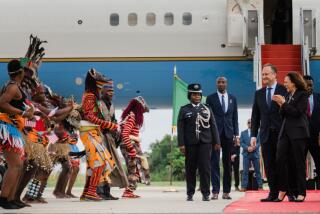A Place at the Table for Africa
- Share via
Africa’s profile in U.S. foreign policy rose sharply in the eight years of the Clinton administration, but this produced few tangible results and Washington’s actual influence on the continent continued to decline. Bill Clinton recognized the strategic importance of Africa--he traveled there twice and members of his Cabinet made numerous visits. But his grand vision was not backed by a coherent policy and a sufficient budget and staff.
President Bush’s challenge will be to pursue a long-term policy setting out achievable goals. Crisis management in violent Sierra Leone, dealing with Zimbabwe’s descent into chaos and combating HIV-AIDS should be among the top priorities.
Bush has given friends of Africa plenty to worry about. As a presidential candidate, he said Africa “does not fit into the national strategic interests” of the United States and it doesn’t count as much as the Middle East, Europe, Asia or Latin America. Now that he is president, Bush may be reconsidering.
Secretary of State Colin L. Powell, one of two African Americans appointed to top foreign policy posts, has made a welcome change in the rhetoric’s tone. Powell, who went to Africa two years ago to monitor Nigeria’s election, met with several African leaders shortly after taking office and has begun beefing up the Africa bureau at the State Department.
If for no reason other than history, the United States has ample cause to be interested in Africa: 30 million Americans have ancestral links to the continent. In addition, one-fifth of U.S. oil imports will soon come from Central and West Africa.
Major African leaders recognize that the fight against poverty and disease starts with political stability, peace and responsible governance at home, but they cannot carry out their recovery plans alone. The HIV-AIDS epidemic threatens to kill one in four Africans in the next decade and create a new form of instability that would spill well beyond Africa.
Washington’s own priorities should be the effort against AIDS, promotion of peace in Congo and Sierra Leone, support for democratic forces in Zimbabwe, building an adequate African peacekeeping force and accelerating debt relief. The U.S. should also nurture an alliance between South Africa and Nigeria; the economic futures of those key nations will affect the populations of the entire landmass.
Clinton’s high-level Africa policy helped generate political support for several initiatives, including debt forgiveness and open-trade legislation but failed to reverse Africa’s growing marginalization. Bush should use his political support at home to promote a policy that will more directly help Africa.
More to Read
Get the L.A. Times Politics newsletter
Deeply reported insights into legislation, politics and policy from Sacramento, Washington and beyond. In your inbox three times per week.
You may occasionally receive promotional content from the Los Angeles Times.










